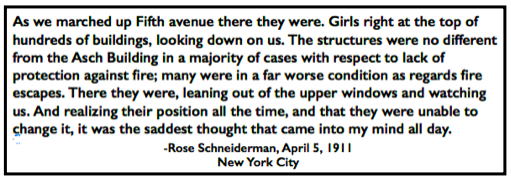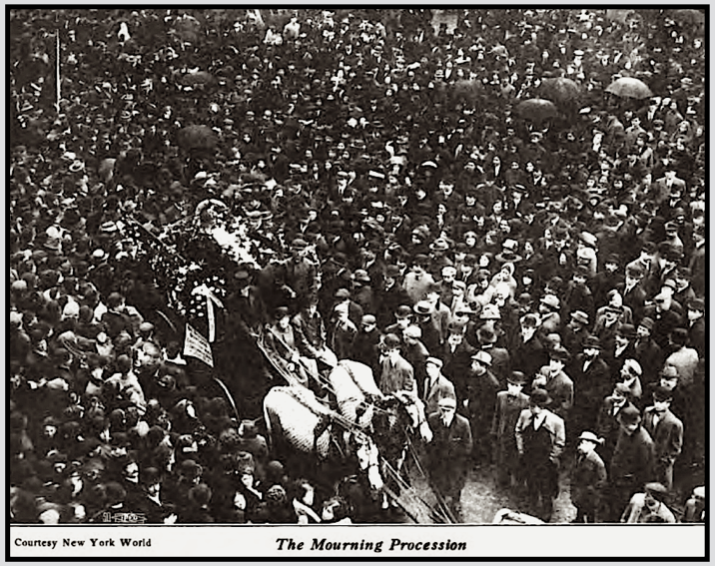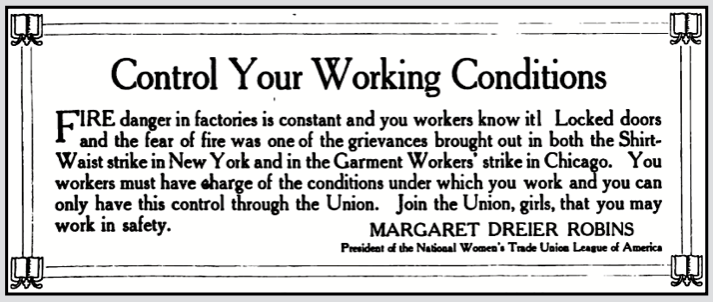 —————
—————
Hellraisers Journal – Saturday May 6, 1911
“The Triangle Fire” by Martha Bensley Bruere, Part II
From Life and Labor of May 1911:
The Triangle Fire
By Martha Bensley Bruere
Well, the fire is over, the girls are dead, and as I write, the procession in honor of the unidentified dead is moving by under my windows. Now what is going to be done about it?
Harris and Blanck, the Triangle Company, have offered to pay one week’s wages to the families of the dead girls-as though it were summer and they are giving them a vacation! Three days after the fire they inserted in the trade papers this notice:
NOTICE, THE TRIANGLE WAIST CO. beg to notify
their customers that they are in good working order.
HEADQUARTERS now at 9-11 University Place.The day after they were installed in their new quarters, the Building Department of New York City discovered that 9-11 University Place was not even fireproof, and that the firm had already blocked the exit to the one fire escape by two rows of sewing machines, 75 in a row, and that at the same time repairs were begun on the old quarters in the burned building under a permit winch called for no improvements or alterations of any conditions existing before the fire. It called for repairs only, which means, it was generally conceded, that the place would be re-opened in the same condition it was in before the fire.
That is what the employers have done.
The public has held meetings of protest —many of them. It has passed resolutions and subscribed over $80,000, to be expended through the Red Cross Society and a Citizens’ Committee formed for the purpose.
What have the girls, working through their union, done for themselves? $15,000 was collected by the Ladies’ Waist Makers’ Union, the Forwards and the W. T. U. L. for the relief of the bereft families.
Early on the morning of the day after the fire, a meeting of the Executive Board of the Ladies’ Waist and Dressmakers’ Union was called, and relief work begun, no one knowing better than the girls who worked in the same trade what it meant to a family when the bread winner brought home no money on Saturday night. The girls themselves contributed, there was a call for funds throughout the unions and relief visitors were sent out within an hour. The Union offered to bury all unclaimed bodies and during the week following the fire the Relief Committee arranged for 21 burials. Not all of those buried were union members, as the Committee drew no line. Beside the burials immediate relief in the shape of cash payments and medical attendance has been given and rent falling due on the first of the month has been paid.
The Union has four classes of cases to consider: First, where families were deprived of all support. Second, where the dependent families are in Europe. Third, where partial support of families has been lost. Fourth, where people were injured and have to be helped until they are well.
A compensation act was declared unconstitutional a few days before this fire. The community lays the burden on the workers and safeguards the employers. The Executive Board of the Union has also instructed its attorneys to make such an investigation as will place the blame where it belongs with a view to criminal prosecution.
In one ease at least the workers themselves have taken the matter of their safety in hand. In a kimono factory a fire inspector recently found boards nailed over the window leading to the only fire escape. He took them off, warned the employer of the danger and went away. As soon as he was out of the building, however, the employer nailed the boards back again. On Monday morning after the fire the girls in that shop who were members of the Union went to the forelady and said:
See here, we will not work until the boards are taken off of that window; we are afraid to work unless we know we can get to the fire escape.
The forelady demurred, it did not seem in her province, but the girls would not go to work.
[They said:]
We will not go to work and we will call a strike unless the boards are taken down.
Then the forelady went to the boss.
“I’ll see about it,” he said, and the forelady went back and told the girls.
[Said they:]
That won’t do. We will not wait for him to see about it, either the boards are taken down immediately or we leave the shop.
[A]nd they went to the window, took off the boards with their own hands and sat down at their machines.
The Inspector of the Building Department had failed to help them, all the policemen in New York, the Mayor of the City, or the President himself had not helped them. But the girls by the very simple discovery that if they all stood together they could have what they wanted, had helped themselves.
The same thing has happened in Newark, New Jersey. In the great fire there 25 girls were killed and the Hat Trimmers of Newark realized that they might be burned in the same manner. Being thoroughly organized a committee was appointed from the Union to visit all the factories and interview the employers im regard to windows which were nailed down being opened, obstructions being removed from staircases and fire escapes put in. Each manufacturer was given a certain time to have things put in order, and the girls said that if at the end of that time nothing was done they would strike. At the end of a month these things which the Building and Factory Inspection Departments had failed to do were accomplished by the Hat Trimmers’ Union.
But of course honorable gentlemen and influential boards have met together in great auditoriums and pled with the people. Said the Governor of the State:
I want to assure you that my co-operation will be extended with a firm belief that a repetition of the Washington Square disaster will be avoided.
Said a great banker:
The conditions which led to the Washington Place disaster should never again be allowed to exist in the city.
A professor from the University pled for a concentrated fire department so that we would know in future where to place the blame.
Said a Jewish Rabbi:
We demand industrial peace with security for all.
But how are these things different from what we heard after the Iroquois Theater fire, the Slocum disaster, the Newark fire? Have not the workers been begged before to preserve a judicial attitude? But you can’t impose a judicial attitude on a mother two of whose children have been burned to death before her eyes. Neither can you on seven hundred and fifty thousand people who think their daughters may be burned to death tomorrow.
Said Peter Brady, of the Allied Printing Trades, in answer to the honorable gentlemen and the influential boards:
We have very little confidence in your Citizens’ Organization. Not so much as in Capitalistic Greed and Political Neglect.
And Rose Schneidermann of the Cloth Hat and Cap Makers’ Union put it more definitely still when she said last Sunday [April 2nd] in the Metropolitan Opera House:
This is not the first time men and women have been burned to death. The life of men and women is so cheap, property is so sacred, there are so many of us to every job, that it matters little if 143 die.
Citizens, you have been tried time and again and found wanting. It would be treachery and treason to those burned bodies if I came here to talk fellowship. Too much blood has been spilled!
And still as I write the mourning procession moves past in the rain. For two hours they have been going steadily by and the end is not yet in sight. There have been no carriages, no imposing marshals on horseback; just thousands and thousands of working men and women carrying the banners of their trades through the long three-mile tramp in the rain. Never have I seen a military pageant or triumphant ovation so impressive; for it is not because one hundred and forty-three workers were killed in the Triangle shop-not altogether. It is because every year there are fifty thousand working men and women killed in the United States-one hundred and thirty-six a day; almost as many as happened to be killed together on the 25th of March; and because slowly, very slowly, it is dawning on these thousands on thousands that such things do not have to be!
It is four hours later and the last of the procession has just passed.
[Emphasis added.]
~~~~~~~~~~~~~~~~~~~~~~
SOURCES & IMAGES
Quote Rose Schneiderman, NY Tb p2, Apr 6, 1911
https://chroniclingamerica.loc.gov/lccn/sn83030214/1911-04-06/ed-1/seq-2/

1912
Life and Labor
“Published by the National Women’s Trade Union League”
(Chicago, Illinois)
-May 1911, Part I-page 137, Part II-page 139
“The Triangle Fire” by Martha Bensley Bruere, Part II
https://babel.hathitrust.org/cgi/pt?id=uc1.b3859487&view=2up&seq=149
See also:
Hellraisers Journal: “The Triangle Fire” by Martha Bensley Bruere
Part I -from Life and Labor, Official Organ of WTUL
Hellraisers Journal: Women’s Trade Union League Joins Mass March for the Unidentified Victims of the Triangle Fire, April 5th
May 2, 1911, NY Times-May Day March in Tribute to Triangle Fire Victims Viewed by Half-Million
https://www.newspapers.com/clip/77140627/may-2-1911-ny-times-may-day-march-in/
Tag: Triangle Shirtwaist Factory Fire
https://weneverforget.org/tag/triangle-shirtwaist-factory-fire/
Martha Bensley Bruere, NY Eve Wld p9, Aug 5, 1912
https://chroniclingamerica.loc.gov/lccn/sn83030193/1912-08-05/ed-1/seq-9/
See obits at findagrave:
-Martha Bensley Bruere
https://www.findagrave.com/memorial/188427239/martha-bensley-bruere
Robert W. Bruere, her husband
https://www.findagrave.com/memorial/188426880/robert-w-bruere
~~~~~~~~~~~~~~~~~~~~~~~~~~~~~~~~~~~~~
Ballad of the Triangle Fire/Bread and Roses
– Dora Wasserman Yiddish Theatre


